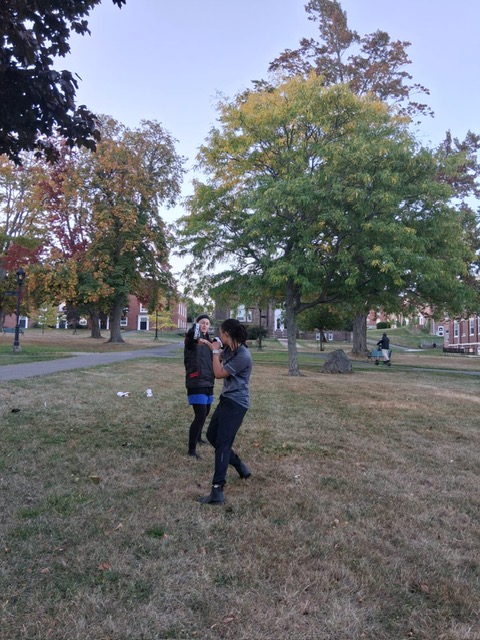A new series of martial arts-based exercise sessions hosted on campus
present students with not only a chance to learn some of the physical skills key to
martial arts, but dive into the philosophy and ethics which are essential to
Taekwondo. Taekwondo is a Korean martial art that has its roots in earlier practices
including Taekkyon and Karate. The sessions are being led by Allison Whritenour
in collaboration with the Manning Memorial Chapel and Acadia Student Services.
Allison graduated from Acadia in 2010 with a bachelor’s degree in kinesiology.
She is an athletics and sailing coach, as well as a personal trainer, and has a first
degree black belt in Taekwondo. The sessions take place in the chapel basement
from 7:00 to 8:00 AM on Wednesdays, and will run from September the 17th to
November the 26th.

The series aims to be beginner friendly and provide a supportive learning
space. Students focus on techniques for blocking, kicking and striking while
building strength, balance and flexibility. Building these physical skills can have a
longer lasting positive impact. In our conversation, Allison noted that “physically,
martial arts build strength, balance, and posture that support healthy movement
patterns for life. I’ve found that my skills have served me well in unexpected
moments.”
Beyond just physical practice, the series incorporates self-awareness,
mindfulness and the ethics of martial arts through reflections and journaling
prompts. Allison reflected on the importance of this part of Taekwondo practice
during my conversation with her, writing, “I’ve loved bringing creativity into
traditional Taekwondo practice by incorporating elements of personal development
from my own lived experience. It’s helping me connect to the practice in new ways
while also learning a lot in the process. One of the most meaningful parts has been
creating reflection and journaling resources that show how training can benefit
aspects of everyday life—things like self-awareness, body language, mindfulness,
strategies for threat mitigation, translating our internal sensory language and
learning to navigate discomfort and self-doubt. Learning how to harness the
empowering energy that we experience while practicing martial arts to benefit us
on personal and professional levels has been a powerful breakthrough and it means
so much to me to get the opportunity to offer what I’ve learned to the community.”
A primary goal of this martial arts practice is to develop a sense of
self-confidence and resiliency in participants. A strong sense of self-worth is
important to maintaining positive relationships with other people and overcoming
challenges in a variety of environments, including educational, work and social
settings. Allison writes, “Beyond that, martial arts practice fosters positive body
image and self-worth – the personal, relational and professional impacts of such are
enormous and not always obvious. Partner exercises in particular help people
understand their personal power and boundaries. These skills are essential in the
workplace: whether it’s standing up to injustice, navigating subtle abuses of power,
or preparing to enter professional environments where resilience is
essential—especially for women and marginalized groups. For me, these skills
were most helpful while working in the marine world, which was both exciting and
extremely challenging. I was able to lean on my training for the confidence to use
my voice, take responsibility for safety in dangerous environments, and trust
myself to handle high-stakes situations.”

Another primary aspect of the sessions is building self-awareness and
mindfulness. These practices can be beneficial for improved emotional regulation,
focus, and memory. Allison writes, “Practices like mindfulness and meditation
bring stillness, clarity, and mental focus, while also enhancing self- and situational
awareness. Regular training also helps us to stay calm under pressure and to
regulate our emotional reactions.”
For students seeking a supportive space to try a new form of exercise,
hoping to challenge themselves with a practice that supports reflection and
personal-growth, or simply looking to try something new, martial arts has
something to offer. As a final note on her ambitions for the sessions Allison writes,
“What I most hope students take away is that martial arts practice isn’t just about
physical training – it’s about cultivating courage and confidence, and building our
capacities for responsibility and leadership. This foundation impacts every area of
life from personal and professional relationships, to trusting ourselves to pursue
our dreams and visions for a full, rich life.
